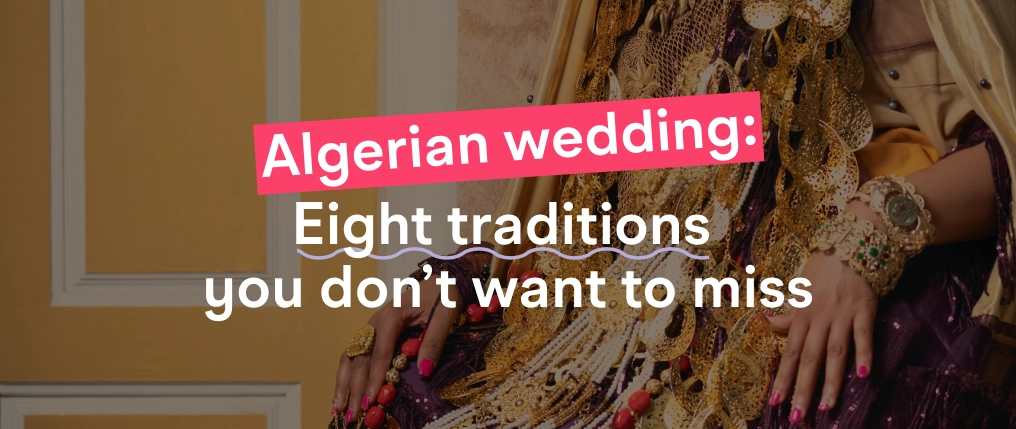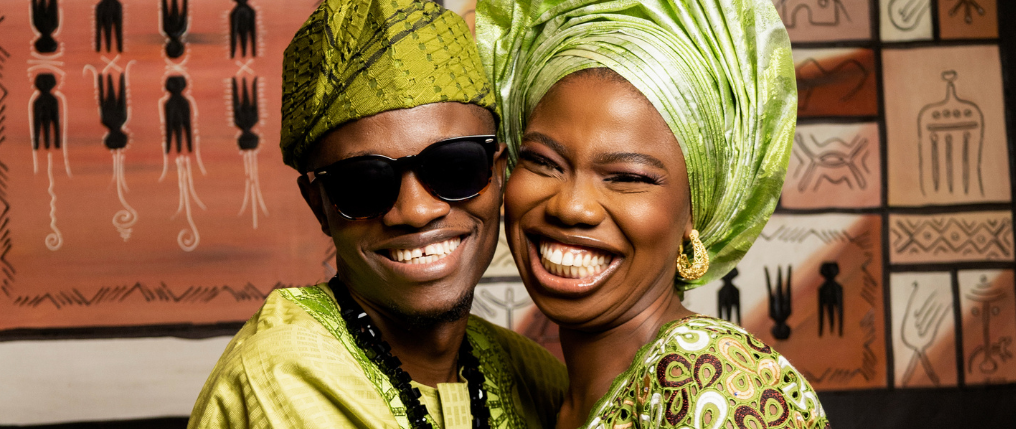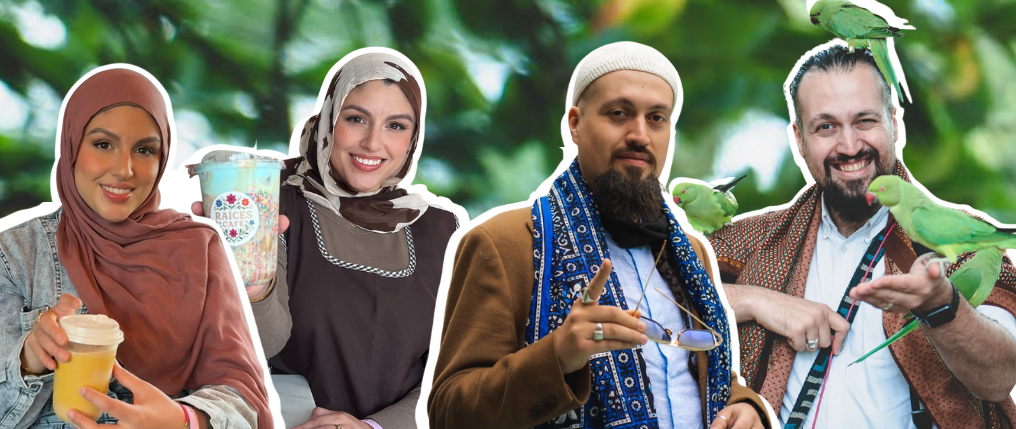
Algerian wedding: 8 traditions you don’t want to miss
December 5, 2023

Algerian weddings are a delightful blend of tradition, love, and celebration. From the enchanting “La Khitba” to the mesmerizing Henna Night, and the heartwarming “El Khouara” ceremony, these unique and captivating moments make an Algerian wedding an unforgettable experience.


Looking for your soulmate?
You won’t find your soulmate on this blog post but you might find them on Muzz - the world’s biggest Muslim dating and marriage app.
Whether you’re curious about the traditions of your own Algerian heritage or simply intrigued by the beauty of diverse wedding customs, this blog post promises to be a captivating exploration of the cherished traditions that unite hearts and souls in a wedding celebration. So, get comfortable and read on.
Table of Contents:
How long does an Algerian wedding last?
1. The Khotba
2. Hlel, the marriage contract
6. The Algerian wedding procession
What’s the difference between an Algerian wedding and a Muslim wedding?
How long does an Algerian wedding last?

The duration of an Algerian wedding can vary depending on cultural traditions and personal preferences. In general, Algerian weddings can last anywhere from one to seven days. The duration of the wedding may also be influenced by factors like the couple’s financial capacity, cultural customs, and regional norms.
Here’s a breakdown of the common timeframes for an Algerian wedding:
- One to Three Days: Many Algerian weddings are celebrated over one to three days. The main events, such as the henna night, the ceremony of “El Khouara” or “La Khotba,” and the wedding reception, are typically held during this time. The festivities may start with the Henna night, followed by the ceremony, and culminate with a grand wedding reception.
- Three to Seven Days: Some families prefer to extend the wedding celebrations to three, five, or even seven days. This allows for more pre-wedding rituals, additional parties, and ample time for socializing with extended family and friends.
1. The Khotba

The “La Khitba” or “Khotba” is the engagement phase of an Algerian wedding. Although not obligatory, it is still recognized by law. According to the law, “engagement constitutes a promise of marriage, and either party can renounce it.” Therefore, the “La Khitba” holds no legal effect.
Related content: What are the Muslim marriage rules?
During the “La Khitba,” a delegation from the groom’s family, typically including the groom, his parents, paternal and maternal uncles, and older siblings if applicable, visits the bride’s family to formally request her hand in marriage.
2. Hlel, the marriage contract

After the engagement comes the big moment – the “hlel”, the official marriage contract! It’s like the next step after the engagement ceremony, making everything official.
So, here’s the deal: A religious man, often an imam, prepares the contract, including all the important terms of the marriage. Once it’s ready, both the bride and groom sign it, sealing the deal with their own signatures!
Related content: Everything you need to know about Nikkah
But wait, there’s more! To make it all legal and binding, they need 2 witnesses or more. They ensure that everything is done right and that both the bride and groom are happy and consenting.
So, the “hlel” is like the official stamp on the marriage, and it’s such a beautiful step in an Algerian wedding journey!
3. The Hammam day

On this special day, the bride gets to have a relaxing and enjoyable time with all the lovely women in her family. They head to the hammam, which is a traditional bathhouse, for some pampering and bonding.
The bride wears a stunning “fota,” a golden fabric jumpsuit, and she’s all set to have a blast with her closest ladies!
Related content: What to expect at an African wedding as a first-time guest
Oh, and there’s more! The bride gets a thorough wash, even a clay mask for that glowing skin! Plus, complete hair removal for that perfect look.
So, it’s a day of self-care, bonding, and excitement for the bride and her fabulous ladies!
Once they’re done at the hammam, they return home, and the women already there greet them with happy “youyous”.
4. The El Khouara party

The El Khouara ceremony is next in line after the relaxing time at the Hammam. The El Khouara is super fun! The bride gets to show off various traditional outfits in a cool parade. Depending on the family’s comfort level, she can wear lots of outfits!
During the El Khouara, the bride’s mom throws a party and invites all her relatives and friends. It’s a time of celebration and joy!
Related content: Tunisian wedding: 7 days and nights of beautiful traditions
The women also give the bride lots of gifts, and they go into a suitcase. This special suitcase is only opened when they apply the henna.
5. The Henna night

On the Henna night, also known as the “Henna party,” the bride-to-be and her female friends and family come together for a joyous and colourful celebration. It’s a night filled with music, dancing, laughter, and, of course, the application of henna tattoos.
The bride wears beautiful traditional attire and has intricate henna patterns applied to her hands and feet, symbolizing beauty, good luck, and blessings for her upcoming marriage.
Related content: 7 traditions to know before attending a Lebanese wedding
The women sing traditional songs and dance in a lively manner, creating a festive atmosphere. They share stories, offer words of wisdom, and shower the bride with love and well wishes for her new journey.
6. The Algerian wedding procession

The Algerian wedding celebrations kick off in the bride’s neighbourhood, and it’s a grand display! They have a beautiful procession that takes the bride from her home to either the wedding venue or the groom’s house. This symbolizes the alliance between the two families and the start of their new journey together.
Oh, you won’t believe your eyes! It’s a milestone moment that’s truly spectacular! There are horses and camels, and it’s different in each part of the country. Sometimes, you’ll see the groom riding the horse as a special rite of passage, and in places like Kabylia, guess who arrives on horseback? Yes, the bride herself!
It’s called Fantasia, and it’s got a fascinating history. It dates back to Arab-Amazigh tribes in the 17th century, where they used it in cavalry raids and celebrations. It’s also practised in Morocco, making it even more special!
Related content: How to prepare a Moroccan wedding
The bride gets to feel like royalty during this procession. Some brides sit majestically on the hump of a camel in a beautifully designed palanquin. They wave to well-wishers and friends and family, feeling like a true queen!
But wait, there’s more! The bride is usually covered from head to toe with a veil called a hayek. It’s a loose garment with a veil for the face. Each region has its own unique style and colours – cream or white in some places, light periwinkle, crimson blue, or maroon in others. It’s all about that cultural flair!
The groom also looks dashing in a long, brown cloak called a burnus, made from wool. The hood is long enough to cover his face, adding a touch of mystery to the moment!
Music is a must during this procession, creating a joyful atmosphere. You’ll hear the tunes of oboe and tambourine players following the couple, a tradition called hadwa.
Related content: 6 Egyptian wedding traditions worth knowing about
Nowadays, they continue the party in a cortege, with the bride in a decorated vehicle, and friends in their cars trailing behind, beeping and cheering along. It’s a celebration you won’t forget!
7. The Fatiha ceremony

The religious wedding, called the “fatha” or “fatiha”, is a significant moment among Algerians. This seals the marriage deal during a special ceremony.
Only the guys show up at this ceremony, and the bride’s represented by her guardian, her wali.
Related content: What happens at an Arabic wedding
An imam leads the ceremony. First, he seeks the young bride’s approval for the celebration. Then, he talks about the importance of marriage and love, making it super special.
To wrap it up, he invites the couple to read a chapter from the Quran. Once the religious wedding is done, the bride and groom can make it official with the civil union.
8. The Wedding celebration

As per tradition, on the final day of the wedding festivities, there’s a special meal for the bride’s parents. When the young girl is all set for marriage, with her hair done up and decked out in beautiful accessories, she goes to her in-laws’ place.
Related content: Exploring Walima: A detailed overview and guide
But her parents don’t accompany her on this journey. Instead, she’s warmly welcomed by her mother-in-law, who offers gifts and good wishes. After that, the groom can take his lovely bride home.
What’s the difference between an Algerian wedding and a Muslim wedding?

An Algerian wedding and a Muslim wedding are related but distinct concepts. The main difference lies in their scope and cultural specificity:
1. Algerian Wedding – An Algerian wedding refers specifically to the wedding customs and traditions practised in Algeria. Algerian weddings are deeply rooted in the country’s culture and can vary based on regional, ethnic, and family-specific customs. They often incorporate unique Algerian traditions, clothing styles, music, and culinary delights.
2. Muslim Wedding – On the other hand, a Muslim wedding refers to a wedding ceremony that follows Islamic traditions and principles, regardless of the cultural background of the individuals involved. Muslim weddings can take place in various countries and among different communities, each with its own cultural influences. Islamic weddings share common elements, such as the recitation of Quranic verses, the signing of the marriage contract, the giving of dowry (mahr), and the presence of witnesses.
Conclusion
In conclusion, our journey through the vibrant traditions of Algerian weddings has been nothing short of awe-inspiring. From the meaningful “La Khitba” that marks the beginning of a beautiful union to the heartwarming “El Khouara” ceremony that showcases the bride’s grace and charm, each moment we explored holds a special place in the hearts of Algerians.
These cherished traditions are a testament to the resilience of traditions passed down through generations, weaving a beautiful tapestry of unity and togetherness.

